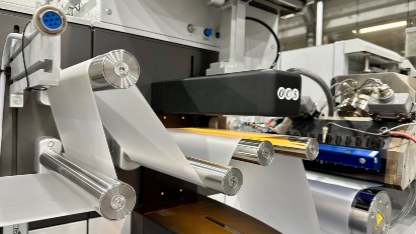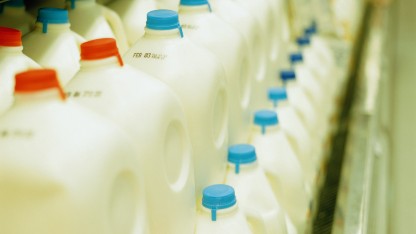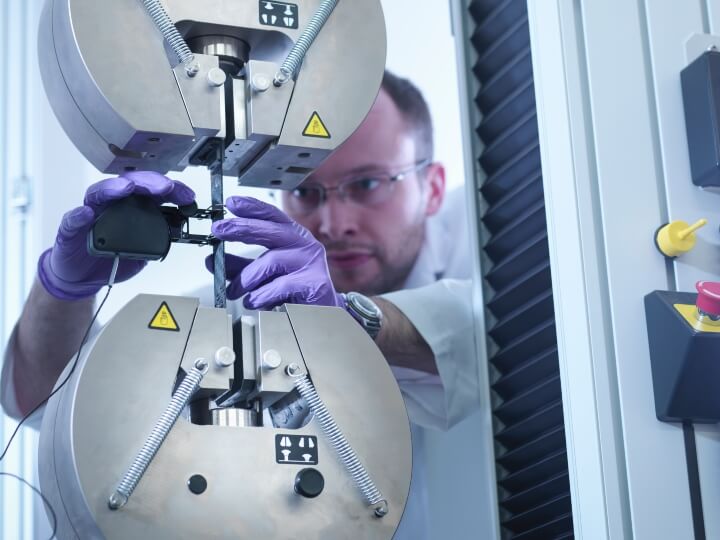Testing of primary aromatic amines in food packaging materials to ensure regulatory compliance with Regulation (EU) No 10/2011 for plastic food contact materials through comprehensive food contact migration studies
Testing for primary aromatic amines in food packaging through studies of migration into foodstuffs is essential as some primary aromatic amines (PAAs) are known to have carcinogenic properties, whilst others are suspected carcinogens. These substances, therefore, may pose a health risk if they transfer from food contact materials to food. Primary aromatic amines are used in the manufacture of azo pigments, such as certain yellow, orange, and red colourants, but they can also be present in inks as impurities of pigments or breakdown products.
PAAs have been detected in plastic food contact materials and also in paper and board food packaging. In Europe, all materials and articles intended to come into contact with food must comply with the European Framework Regulation (EC) 1935/2004. Regulation (EU) No 10/2011 on plastic food contact materials and articles establishes specific requirements for the manufacture and marketing of plastic materials and articles. Regulation (EU) No 10/2011 was amended to include primary aromatic amines listed in ‘the Azocolourants entry’ of the REACH Regulation (EC) No 1907/2006. These should not migrate or be released from plastic materials and articles into food or the food simulant used during migration studies. They should not be detectable using analytical equipment with a detection limit of 0,002 mg/kg food or food simulant applied to each individual primary aromatic amine, per Article 11(4) of Regulation (EU) No 10/2011.
Food Contact Migration Studies and Determination of PAAs
We provide expert analytical determination of primary aromatic amines in food packaging as part of our food contact materials migration testing services. Our analytical experts can apply several analytical strategies to determine the levels of PAAs in food simulants including a liquid chromatography-tandem mass spectrometry (LC-MS/MS) approach or spectrophotometry methods. Our scientists select the most appropriate strategic analytical approach for each project and take into consideration the regulatory requirements for extremely low and specific detection. We are experienced in overcoming challenges related to false positives or complex sample matrices such as multiple migrated components or cloudiness of the resulting simulant. With the selectivity of LC-MS/MS methods, we can directly quantify the concentration of a specific PAA using external standards of the corresponding PAA. The accuracy can be demonstrated by performing standard additions to migrated simulants.
Helping You to Mitigate Risks
Due to the health risks associated with primary aromatic amines in food packaging and food contact materials or articles, coupled with regulated restrictions on the levels of these substance it is imperative to demonstrate that levels in your food contact products fall below the restricted alert and allowable levels. Our team can help you to accurately determine levels of individual PAAs, or use screening methods to analyse for various PAAs, enabling you to risk assess your food contact materials or products.
Food Contact Compliance Testing
Our wider range of food contact material testing includes testing for compliance in your region of interest, overall and specific migration, chemical composition and non-intentionally added substances (NIAS) studies. Alongside testing for PAAs we also perform specific testing for PFAS, heavy metals and trace elemental impurities, phthalates, fluorochemicals and deliver comprehensive services for food packaging where recycled materials have been incorporated through our CircularAssure program as part of our complete set of capabilities for packaging testing.
With decades of experience, we can support you with Total Quality Assurance for fast track and cost-effective approaches enabling you to enter new markets, support the introduction of new products and address changes in regulations. To support product development, we also perform physical testing, processability evaluation and quality assurance and certification in relation to circularity and sustainability. Our global team of assurance and testing experts provide complete food contact regulatory compliance support including, migration protocol development, third party certifications, migration studies, placement and monitoring of toxicology studies to support a submission, as well as guidance for use of recycled content in food contact applications.

Food Contact Materials Testing & Food Packaging Analysis
Food contact materials testing to demonstrate regulatory compliance through experienced laboratory services

Non-Intentionally Added Substances and NIAS Testing for Food Contact Materials
NIAS testing for food packaging safety helping you to mitigate potential health risks

Migration Testing for Food Contact Materials (FCMs)
Food contact material (FCM) migration testing studies including overall migration and/or specific migration

Plastic Film Testing for Quality and Performance
Plastic film testing for quality and performance using factors like gel count and a range of mechanical, physical and optical property testing

Testing Primary Aromatic Amines in Food Packaging
Testing for primary aromatic amines in food packaging materials is key to regulatory compliance for plastic food contact materials

Testing the Physical Properties of Packaging Materials
Hot Tack Testing
Trace Metals Testing for Food Contact Materials

